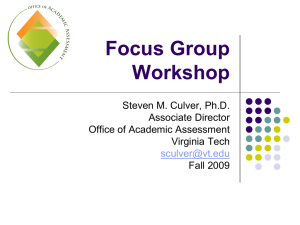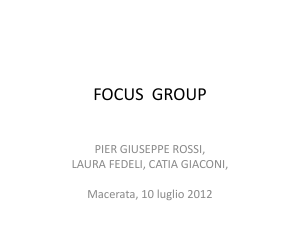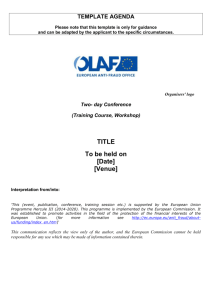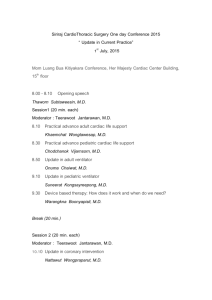Focus Groups
advertisement
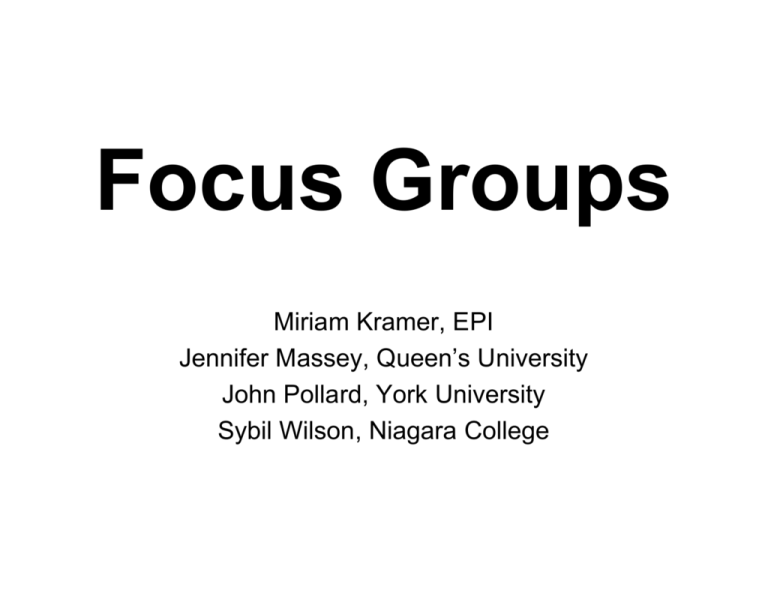
Focus Groups Miriam Kramer,, EPI Jennifer Massey, Queen’s University John Pollard, York University Sybil Wilson, Niagara College What is a focus group? “Focus g groups p are g group p interviews. A moderator guides the interview while a small group discusses the topics that the interviewer raises raises. What the participants say during their discussions are the essential data in focus groups. Typically, there are six to eight participants who come from similar backgrounds, and the moderator is a welltrained professional who works from a predetermined set of discussion topics” (Morgan, 1997). What is a focus group? “A carefully planned discussion designed to obtain perceptions on a defined area of interest in a permissive, nonthreatening environment. It is conducted with approximately 7 to 10 people by a skilled interviewer. Group members influence each other by responding to ideas and components in the discussion.” (Krueger, 2000) What is a focus group? • A rich, wide-ranging discussion which is grounded in the perspective of the participants • Used in marketing research research, policy and program evaluation evaluation, needs assessments, qualitative research, and assists with survey development • Not meant to replace surveys, focus groups gather a range of experiences around a particular topic but do not explain how many people feel the same way • Appear relatively straightforward, but require a certain rigour: designing questions, recruiting participants, ethics, trained moderator, analyzing data What is a focus group? • Discussion guide – about 12 questions - pre-scripted or conversational? • Moderator – main tasks are topic coverage and traffic control • ‘Ice-breaker’ question to begin, track topics throughout • Degree of moderator involvement – how to probe - moderator bias? • Create an environment where participation is possible, handling ‘monopolizers’ monopolizers • Give everyone a chance to have one final comment on topic of interest What is a focus group? “Every group has its y and yyou own dynamic need to acknowledge the participants’ priorities if you want to hear what they have to say. Put simply, it is your focus, but it is their group” (Morgan, 1997). Why conduct a focus group? Selecting/designing an instrument Factors to consider: “Why am I doing this”? • Purpose of the assessment • Type of assessment outcomes • Methodology • Resource availability • Audience expectations • Focus F group versus interviews i t i Why conduct a focus group? In-depth understanding • Rich descriptive details • Understand and explain the way in which individuals make meaning of a situation, experience, or concept • Unpack embedded ideas Why conduct a focus group? Mixing g Methods • Focus group data to design quantitative instrument • Focus group to explain quantitative data How Do I Conduct a Focus Group? Logistical g Nuts and Bolts Who? • Determine inclusion and exclusion criteria • Participants with the same characteristics or different? • Friends or strangers? How many? • How many groups? –exploratory (3-4) or detailed (8-12) – minimum of two! • How many people? Ideal size is about 7-8; maximum is 10; over recruit for no-shows How Do I Conduct a Focus Group? Logistical g Nuts and Bolts Where? • Quiet, confidential, comfortable location • Seated so everyone can be seen • Acoustics are important • College or university board room, library, hotel, research centre, etc. • Do you need a viewing room (do your clients want to observe)? • What kind of audio/video equipment is necessary? When? • Time of day (who (who’s s your target population and when is good for them?) • Date within research project: you will need (ideally) about a month’s time to pull it all together. • You should take this into consideration when planning your research timeline. timeline How Do I Conduct a Focus Group? Timeline At Least One Month Prior to Groups • Undergo any necessary research ethics processes and protocols (at least one month in advance, depending on ethics review guidelines and calendar) • Figure out honoraria amounts • Find and book location (at least three weeks in advance; will need to solidify location before recruiting so you can ideally invite participants to groups at a particular location) • If necessary, find and book a group moderator • Main tasks are topic coverage and traffic control • Important for them to be viewed as objective as possible; must not directly be involved in the project/service that is being investigated or reviewed. How Do I Conduct a Focus Group? Timeline At Least Three Weeks Prior • Draft D ft recruitment it t screener and d fifind da recruiter • Consider inclusion and exclusion criteria • Hire marketing firm or staff/assistant • Important that they are not directly involved in the program/service that is being researched • Recruit • How are you going to recruit (e.g. posters email, posters, email flyers, flyers phone calls calls, website website, mixed, etc. How Do I Conduct a Focus Group? Timeline Two Weeks Prior • Continue recruiting in earnest • Draft discussion guide: • What are the research questions? • Includes moderator introduction and ice breaker • Order food and drinks • Appropriate to audience and time of day • Have honoraria ready S Several l Days D Prior Pi • Gather supplies/make sure facility has: audio/video recorder, name tags, wipe board, paper, pens, sign in sheets • Confirm participants and recruit more as necessary: one to two nights before H How D Do I C Conduct d taF Focus G Group? ? Timeline Day/Night of Groups • Get final confirmed list; sign in sheets; informed consent • Meet and greet participants; check identification and sign informed consent • Conduct focus group—GOOD LUCK! After the Groups • Listen/View recordings • Transcribe groups • Produce report • Evaluate yourself • Did you get the research you were looking for? • Did you ask the right questions? • Are you/your client satisfied? • What can you do better for next time? Challenges of Focus Groups • • • • Recruitment R it t Participation Confidentiality R Recording di Challenges of Focus Groups Recruitment • • • Recruiting participants Selection R Representative t ti sample l Challenges of Focus Groups Maintain participation of group members • • • There e e might g be a do dominant a voice in the group Some members of the group might need encouragement to speak Silence might require the moderator to do additional probing Challenges of Focus Groups Confidentiality • • Ca o gua Cannot guarantee a ee confidentiality of information among group members No guarantee that signing a Statement of Confidentiality means that group members will not talk about the issues outside of the focus group setting Challenges of Focus Groups Recording • • • Locating L ti th the recording di d device i so it captures all voices in the group clearly If recording with videotape videotape, a challenge is for the technician to be unobtrusive so as not to distract participants Transcriptionist may have difficulty distinguishing voices of individuals consistently Challenges of Focus Groups What other challenges can you think of? Questions? Miriam Kramer Senior Research/Policy Analyst Educational Policy Institute 207-20 Maud Street Toronto, ON M5V 2M5 Phone: (416) 848 0215 0215, ext ext. 227 Fax: (416) 849 0500 E-mail mkramer@educationalpolicy.org Web: www.educationalpolicy.org Sybil Wilson, Ph.D. Articulations Facilitator Niagara College St. Catharines, L0S 1J0 Phone: (905) 227-2652 E-mail: sywilson@niagaracollege.ca Jennifer Massey Coordinator – Assessment, Evaluation & Outreach Associate Vice Principal & Dean of Student Affairs Queen’s University 300 Gordon Hall Hall, 74 Union Street Kingston, K7L 3N6 Phone: (613) 533 6000 ext. 74022 Fax: (613) 533 6447 www.queensu.ca/studentaffairs/assessment.html John Pollard Project Manager, Focus Groups and Qualitative Research Institute for Social Research (ISR) York University, 4700 Keele K l Street St t Toronto, M3J 1P3 Phone: (416) 736 5446 Fax: 416-736-5749 Email: isrnews@yorku.ca Web: www.isr.yorku.ca
